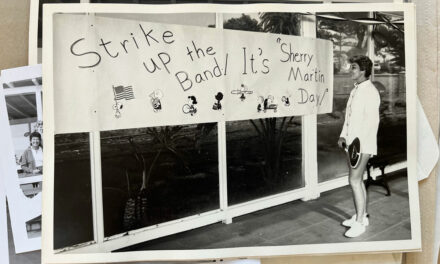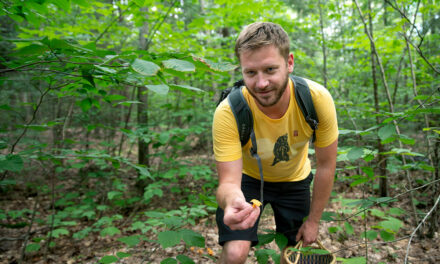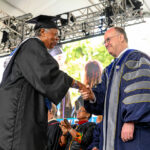
Therapy for the Invisible Wounds of War
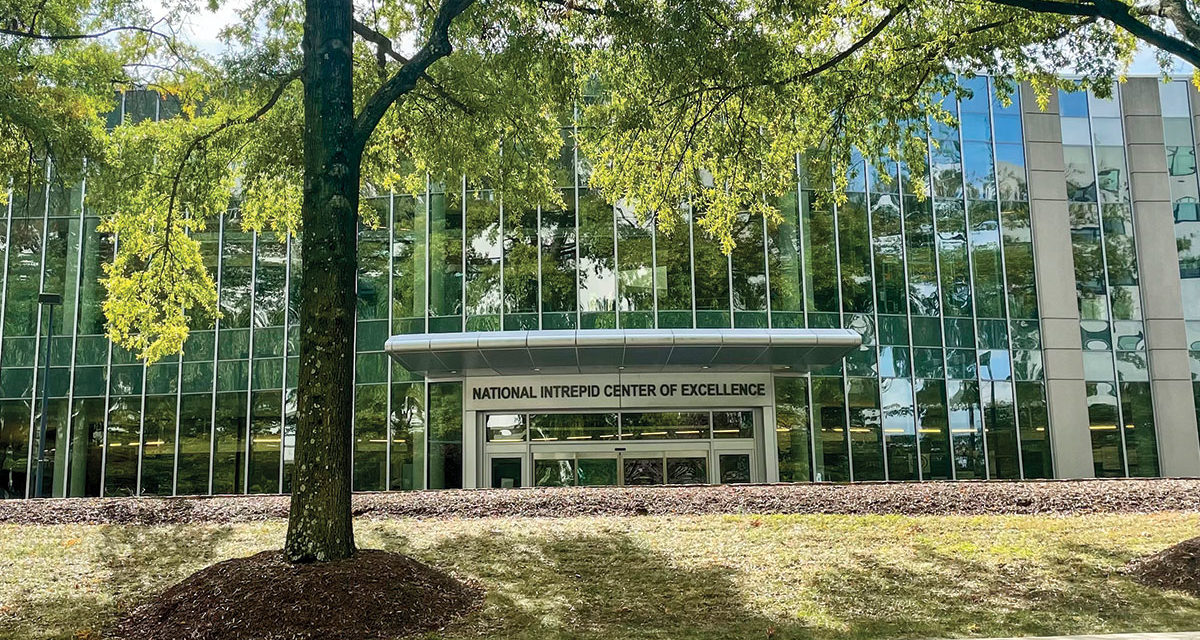
Therapy for the Invisible Wounds of War
Malika Rasheed ’87 is leading a unique dog training program for soldiers with PTSD
BY ELISE GIBSON
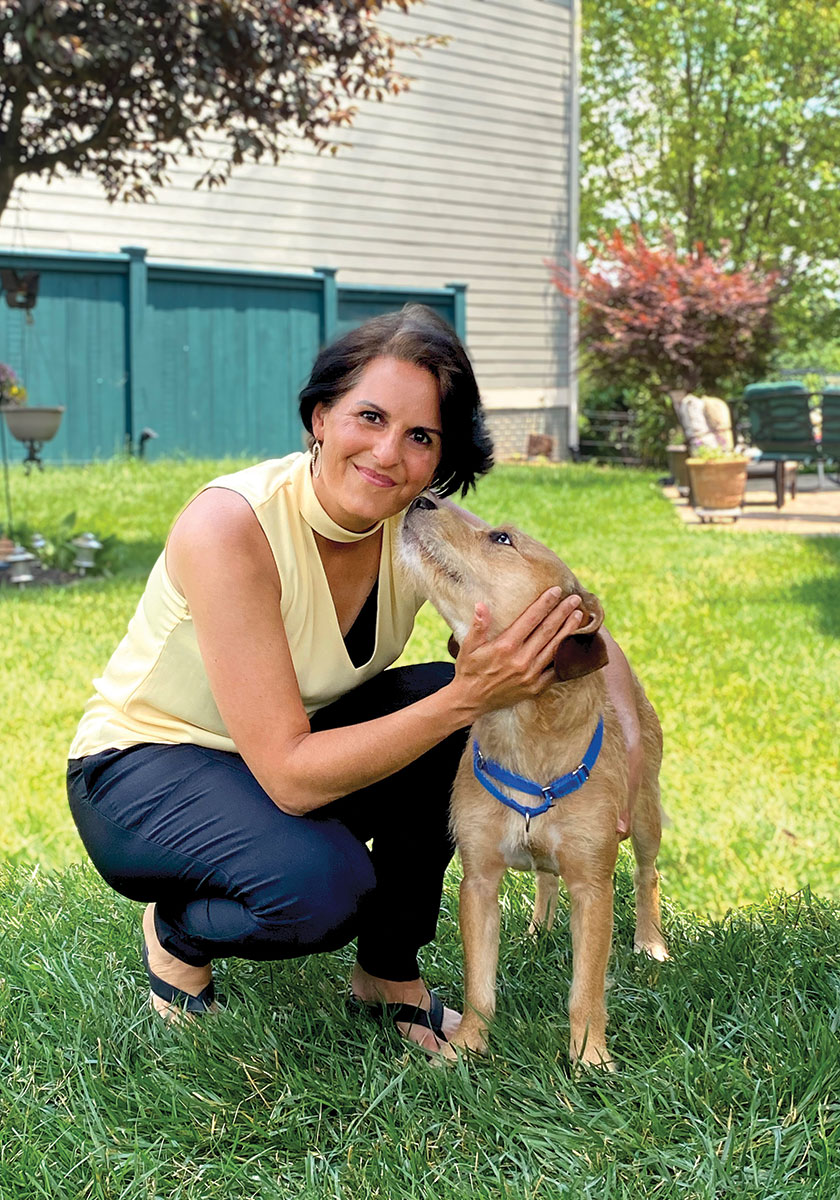
When Malika Rasheed ’87 began bringing rescue dogs to the memory-care facility where her mother was living, she expected a positive response. But what she saw astounded her. “I knew there was something more happening on a neurological level. It wasn’t just that petting a dog makes you happy,” she said of watching the instant connection between the dogs and the dementia population.” There was this neurologic shift in the brain, a neurochemical cascade that happens when oxytocin is released. It’s an amazing phenomenon.”
After her mother died in 2020, Malika had already sold her longtime integrative-medicine practice and began to consider her next steps. The dramatic bond she had witnessed between dog and dementia patient lingered in her memory. “There’s something more to this,” she recalls thinking. Then she made a promise to herself. “I want to devote the next 20 years of my life to helping a fragile, vulnerable population,” she says.
Malika, who holds a doctorate in physical therapy, found that population in an innovative program at Walter Reed National Military Medical Center in Bethesda, Maryland, that provides intensive outpatient neurological treatment in the form of multidisciplinary therapy for active-duty military personnel with traumatic brain injury. These conditions are notoriously difficult to treat and can leave veterans isolated, depressed, angry and suicidal. They hinder a veteran’s attempt to return to civilian life and can tear families apart. The program was looking for a doctorate-level healthcare professional to fully develop a nascent animal assisted therapy program that follows a unique model known as “Mission Based Trauma Recovery.”
Malika had found her mission. “These soldiers are risking their lives every day, 24/7, for us and our safety, and they are continuing to suffer from severe invisible wounds of war,” she says. “They have run through the gamut of treatment options without a successful outcome and now they have an opportunity to try an option which is proving to be successful.”
The therapy program that Malika directs is in the neurology department at the NICoE (National Intrepid Center of Excellence) building. It’s one part of a four-week intensive and individualized treatment plan that includes the creative arts (music, visual arts, dance and movement, writing), occupational and behavioral psych therapy, and any medical tests or scans that are needed. It’s called outpatient care, but the participants live on the Bethesda campus in housing that can include their families in weeks three and four.
As lead practitioner for the animal assisted therapy program, Malika assesses incoming patients and creates a neurological plan of care to treat what she calls “the invisible wounds of war.” Every Monday a cohort of four new wounded warriors from all over the world arrive to begin the program. Many have waited a long time for this unique therapeutic approach. “At least 50 percent of PTSD patients still show signs or still have a diagnosis of PTSD even after all the interventions they’ve received,” she says.
Malika’s work involves service dogs—specifically labradors and golden retrievers—that are trained to provide mobility and behavioral assistance to veterans with a wide range of disabilities. For instance, a dog may be trained in the “brace command” so that an amputee patient can lean on the animal while transferring from bed to wheelchair. A dog trained for behavioral assistance might help with a patient’s nightmares by jumping off the bed, turning lights on to wake the patient, and then using its weight to comfort and calm the patient. But all of those amazing skills come later; first, they must be trained in basic commands. The program from infancy to completion usually takes 24 months, at which time a graduate canine will be paired with a Veteran with limited functional mobility.
In Malika’s program, the therapy for these active-duty military personnel, who are suffering from debilitating cases of PTSD and TBI, is to train the dogs. That’s their therapeutic intervention. And in some cases, they don’t even realize it. All they know is that they’ve been asked to train future service dogs to help a fellow veteran. For the soldiers, Malika says, it comes down to the “warrior ethos.” “Once they find out that they will be helping a fellow battle buddy, It’s just ingrained in their brain to always, always look out for their fellow soldier,” she says. “When I say, ‘Hey, how would you like to help a fellow veteran by helping us train these service dogs?’ They’re like, ‘Hell, yes.’ It’s a no-brainer for them.”
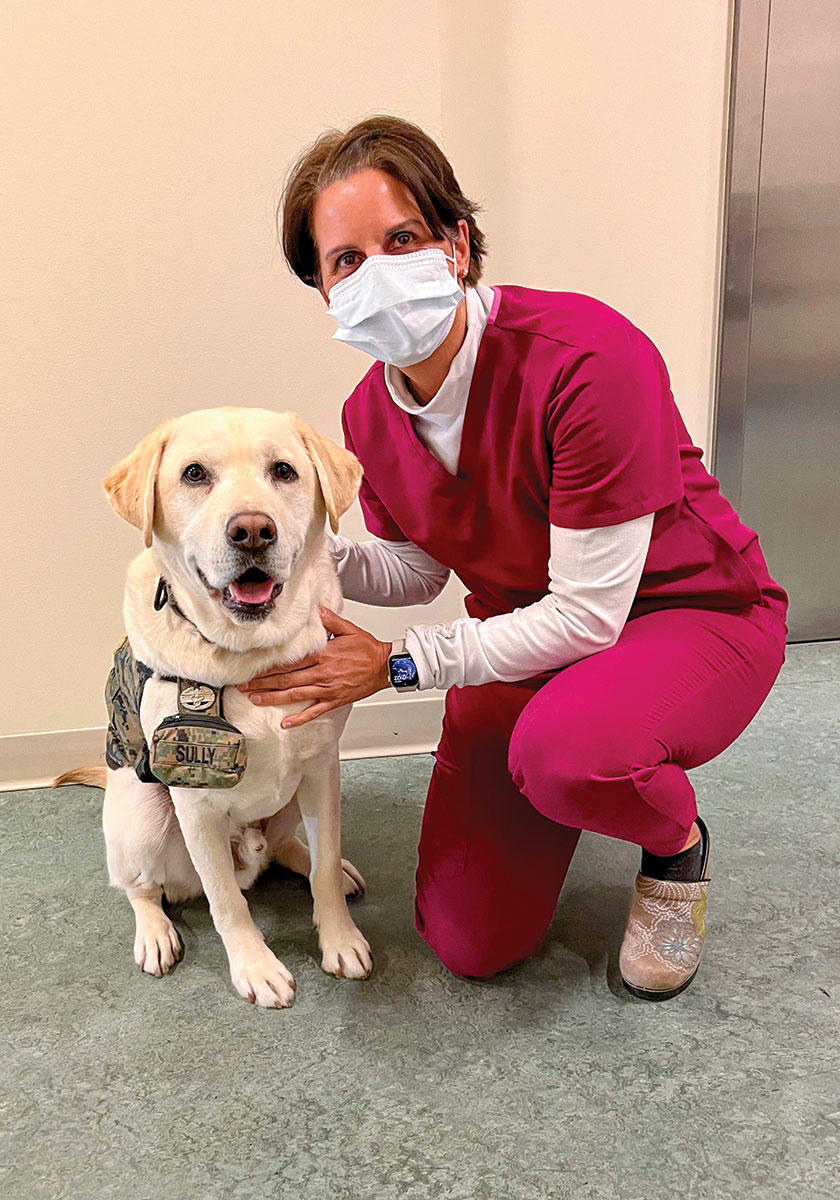
It may seem like a job rather than therapy, but Malika says the benefits are apparent and measurable. “You see this amazing connection between human and animal, and the minute they bond, when they have eye contact with the dog, there’s an immediate oxytocin release,” she says. “This has been demonstrated on MRIs in the left auditory cortex, a region of the brain that scientists recently discovered has neurons that produce oxytocin.”
Documenting and reporting successful outcomes can lead to clinical trials and further acceptance as a treatment, and so measuring the efficacy of the program is central to Malika’s work. Documentation of success, she says, can “show clinical appropriateness and effectiveness for treating traumatic brain injury and PTSD.”Documenting and reporting successful outcomes can lead to clinical trials and further acceptance as a treatment, and so measuring the efficacy of the program is central to Malika’s work. Documentation of success, she says, can “show clinical appropriateness and effectiveness for treating traumatic brain injury and PTSD.”
The key to successful treatment, she notes, is to alter the body’s response to stress. Soldiers with Traumatic Brain Injury live in a state of sympathetic overdrive. “They’re constantly on the ready: ready to fight, ready to battle. They can’t sleep because their minds are just wired, wired, wired,” she says. “When oxytocin gets released, it switches the nervous system from sympathetic to parasympathetic; that’s what allows us to relax, to be able to be grounded and focused. It allows us to better regulate our emotions.”
“Patients come back to us and say, ‘I can’t believe it, I’m not screaming at my kids anymore. I’m able to be more affectionate and supportive and respectful to my wife.’”
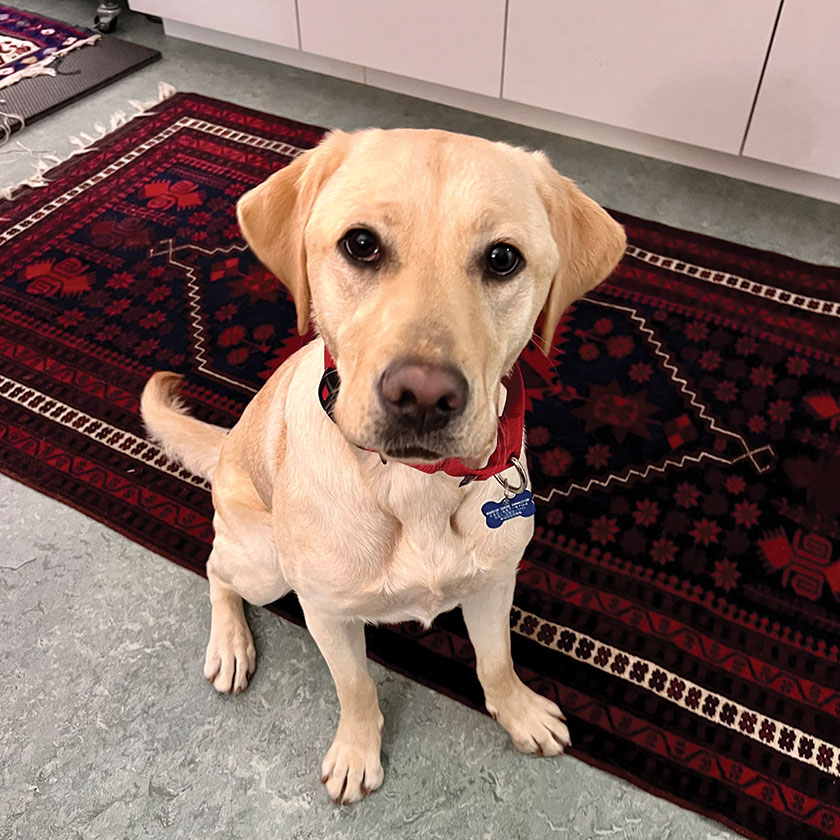
Malika promotes a sense of calm from the moment she meets each new patient. The NICoE building on the Walter Reed campus is new and modern; by contrast her office is cozy and serene. The lights are low, soothing music and the scent of eucalyptus fill the air, and Persian rugs are underfoot. “I want them to feel that they can walk into a calm, healing and most importantly safe space,” she says.
She includes postural corrections and breathing exercises, but a dog is never far away. “Sometimes when I find patients to be depressed, or they just can’t make eye contact, I have them lie on a foam roller on the floor, with a dog lying next to them,” Malika explains. “I teach them diaphragmatic breathing and the dog begins to sync with the patient. The genetic code of a dog is synchronization. Once the patient has engaged their parasympathetic nervous system, they can find calm connection and even improve sleep. If they’re not sleeping, they are not healing.”
The intensive program runs from 8 a.m. to 4 p.m. on weekdays, with back-to-back therapies throughout the day. For Malika, the regular hours are a break from the 12-hour days she kept for 17 years as a business owner. She credits her husband of 28 years, Emad Nekoo, a software engineer, with keeping the house running and the children fed during that time. Their 20-year-old daughter is an environmental science major at the University of Maryland and will be studying abroad in Singapore this summer. Their 22-year-old son is completing a master’s in aerospace engineering at Virginia Tech, Malika’s alma mater. During her years at St. Agnes, Malika was on the tennis team, and tennis remains a big part of her life.
After fostering rescue dogs and finding homes for ten of them, Malika found a dog for her family, a Jack Russell terrier that had been dumped in a dumpster by a breeder. Connecting with dogs, it seems, is in her blood. The dogs in the therapy program—three black Labs and a Golden Retriever—live off-base with their “puppy parents,” who also serve as the canine instructors.
As the patients work with the dogs, they learn to become benevolent leaders, to harness the power of positive reinforcement and patience, even in the face of frustration. Malika
describes how a patient might respond: “No matter how many times I have to train this dog to sit, if I start getting upset or raising my voice, the dog is not going to sit. I have to be calm and cool. And I have to do the same thing with my kids at home. That is how it transitions into their personal life.”
She recalls one recent patient with multiple tics. Every 15 seconds he blinks his eyes, smacks his lips, clears his throat. It happens no matter what he’s doing—except when he’s with the dogs. “Five minutes into the session, the tics have disappeared,” she says. “This is the one program that we’re finding is make or break. This is the one that’s making the difference for them.”
Upon completing the program, the patients write a letter to the dog they’ve trained. At a final ceremony, the staff gives the dog the letter. “The dog salutes them as they walk,” Malika says. “It’s very emotional and gratifying.”
Results like that have made Malika passionate about her work. She’s so passionate, in fact, that she hopes the program model will be adopted at military treatment centers around the world.
“My mission is to make this program, here at NICoE, global. I would like to educate practitioners at military bases in Germany, Norway, and other bases around the world. There are a lot of veterans suffering everywhere,” she says. “It’s what I want to do until I can’t do it anymore.”
Elise Gibson, former editor of the Smith [College] Alumnae Quarterly, is a freelance writer.

